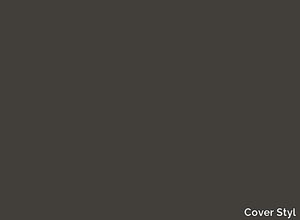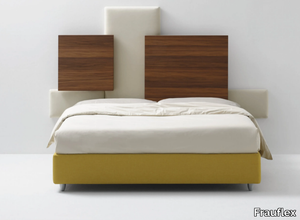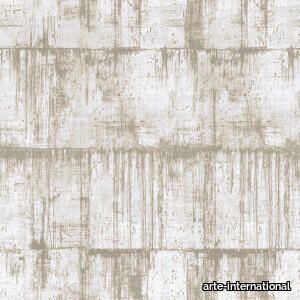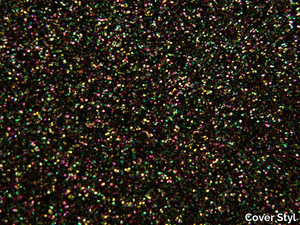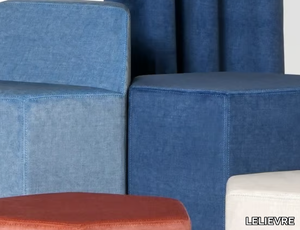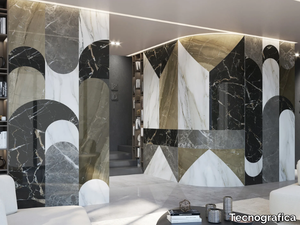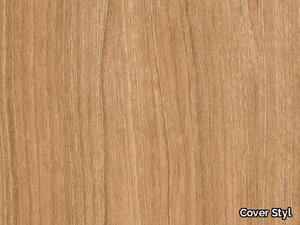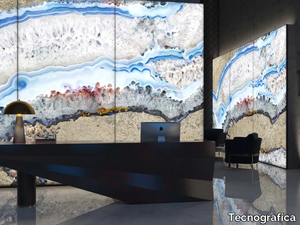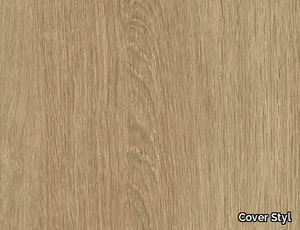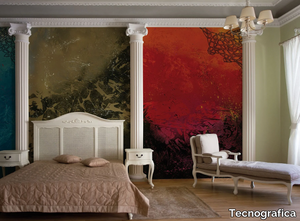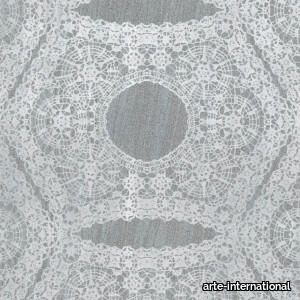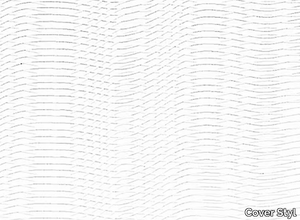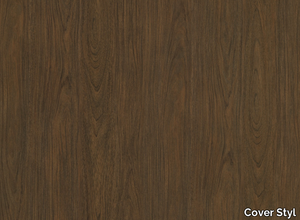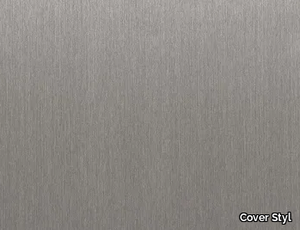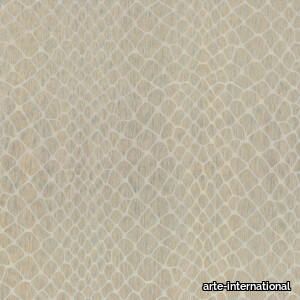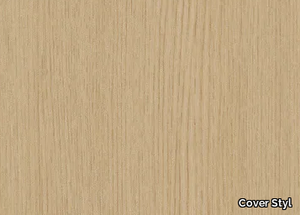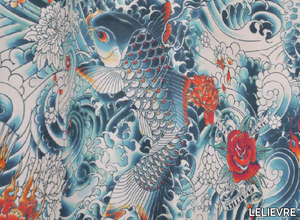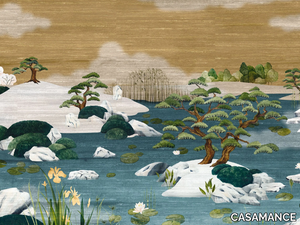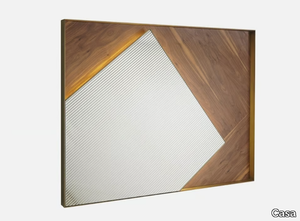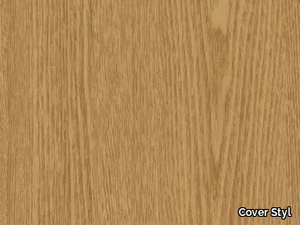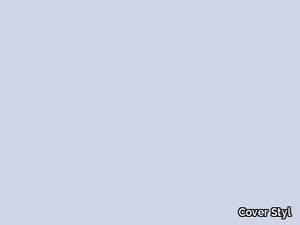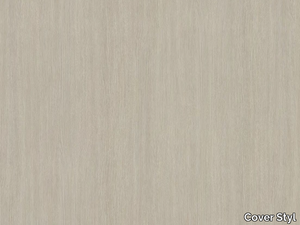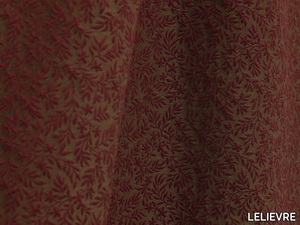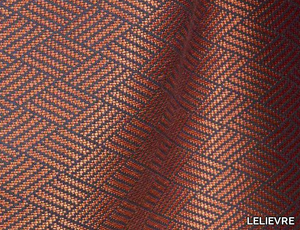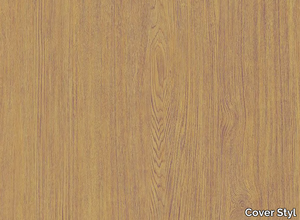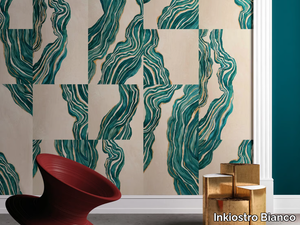Shibam
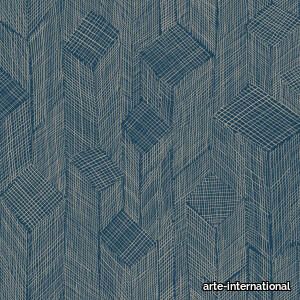
arte-international > Wallcovering
This intriguing pattern has a subtle three-dimensional effect through the rendering of open woven sisal patchwork in different directions. The sisal threads are uneven and have a rough character, allowing the imperfections come into their own.
Menagerie of Extinct Animals Wallcovering
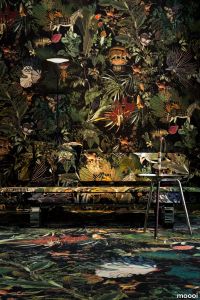
moooi > Wallcovering
A fantastic fauna print digitally printed on soft touch textile with a non-woven backing in which each of the 10 extinct animals is mysteriously hidden.
Pentagono
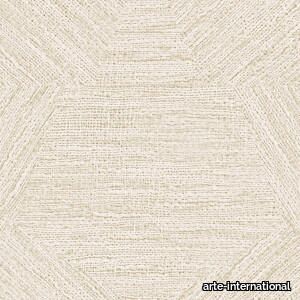
arte-international > Wallcovering
Pentagono has the soft, tactile appeal of luxurious bouclé. The fabric was designed with a graphic pattern of pentagons. This sleek design creates an interesting contrast with the typical casual look of bouclé.
Oblique
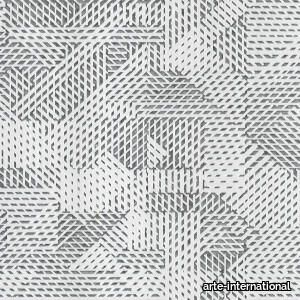
arte-international > Wallcovering
Oblique, which literally means ‘slanting’, is the perfect name for this design. You can clearly see the monochrome effect from a distance. In close-up, you can also see the influence of architecture. The overlapping geometric figures create a fun effect, mainly due to the striking colour nuances.
Window
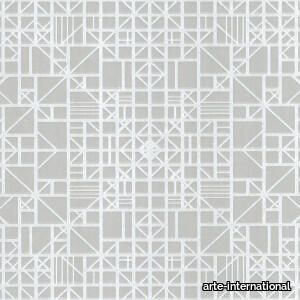
arte-international > Wallcovering
A tile pattern: from a distance, it looks as if you have hundreds of small tiles on your wall. The turquoise design will make you think you are in an oriental palace. Moreover, the geometric motifs suggest the Art Déco style: decorative and somewhat eclectic.
Bambusa
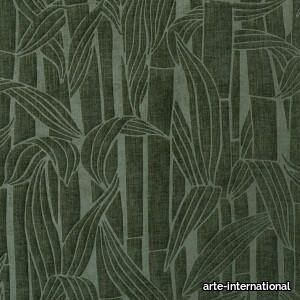
arte-international > Wallcovering
A mix of botanical patterns and jungle scenes. This relief wallcovering creates a subtle yet cuddly, three-dimensional effect thanks to the use of chenille fabric.
Stellar
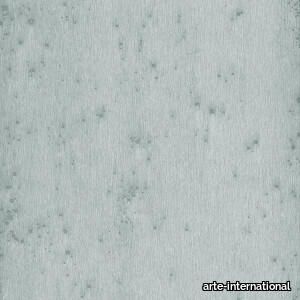
arte-international > Wallcovering
The soft metallic lustre of this metal foil creates a unique light reflection. This makes the design look different from various angles and creates a dynamic atmosphere. The authentic metal look creates the effect of impressive metal panels.
MOUVEMENTS - IMPULSION - Fabric wall fabric with graphic pattern _ Élitis

Élitis > Wallcovering
**Mouvements - Impulsion** is a sophisticated textile wallcovering that combines aesthetic appeal with practical functionality, featuring permanent fire resistance and excellent light resistance. Composed of 70% cotton (CO) and 30% polyester (PC) with a non-woven backing, it is available in a range of captivating colors: *Erodé par le temps | RM 1022 65*, *S'attacher aux reflets | RM 1022 72*, *Sensuelles entailles | RM 1022 90*, *Elever sa conscience | RM 1022 91*, and *Le pouvoir de l'imaginaire | RM 1022 92*. Inspired by contemporary art, the *Mouvements* collection showcases textured abstractions, laser-etched satin finishes, and lacquered light effects, creating a dynamic interplay of depth and movement. A 3D file of the product is available for download, allowing for seamless integration into design projects. Élitis, the supplier, is a globally recognized French brand founded in 1988, celebrated for its innovative and luxurious wallcoverings, fabrics, and furniture that blend bold, contemporary designs with timeless elegance.
Combine
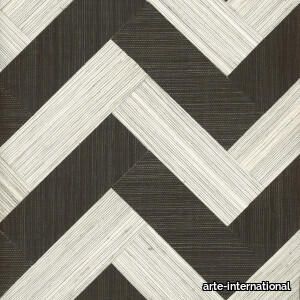
arte-international > Wallcovering
A herringbone motif often appears busy, but by implementing it with sisal, the design Combine gets a much softer and more natural look. A joy (and thus not a burden) for the eye. The soft range of tints in the fabric ensures a quiet pattern that has a nice balanced appearance. In addition, this type design makes your rooms appear higher.
Bambou
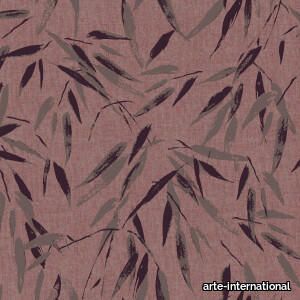
arte-international > Wallcovering
The floating bamboo leaves give the Bambou pattern a delicate touch. Have you ever travelled to Thailand, Vietnam or China? Then this print will take you back to those exotic locations. Bambou is a little bit different to the other patterns because the wallpaper is finished with a hint of flock and metallic ink.
Flying Coral Fish
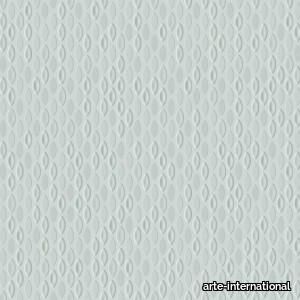
arte-international > Wallcovering
3D wallcovering with a satin look and a pattern resembling the pectoral fins of the Flying Coral Fish, shaped like delicate, thin and translucent wings.
Dwarf Rhino Wallcovering
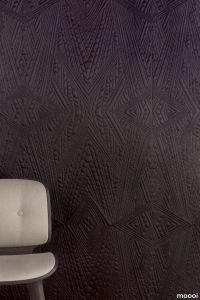
moooi > Wallcovering
Soft suede 3D wallcovering based on the unique structure of the ancient skin and the typical grey-brown folds that section the Dwarf Rhinos body bearing the appearance of a suit of armour. 
Buildtech/2.0 Build White TU
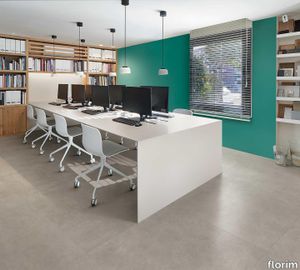
florim > Wallcovering
Buildtech/2.0 assures the realization of ever-current projects To the four colors, White, Bone, Mud and Coal in Tinta Unita, Granigliata and Cemento, 10 solid bold colors are being added, only intensifying the "brutality".<br />
Wind
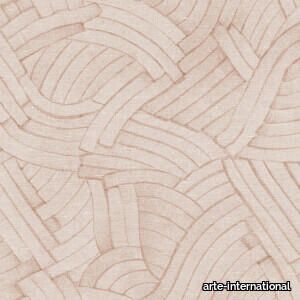
arte-international > Wallcovering
Timeless wallpaper that interprets geometry in a new, modernistic way. The fine structure perfectly reflects the warmth and subtlety of the textiles.
Manali
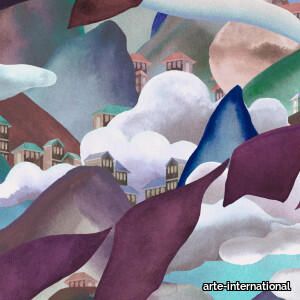
arte-international > Wallcovering
A timeless representation of the traditional mountain villages of the Himalayas, where Buddhist prayer flags often flutter in the wind. The inhabitants of these inhospitable areas try to attract happiness and prosperity in this way. The design was named after the Himalayan village of Manali, where hundreds of flags set the scene.
Grant
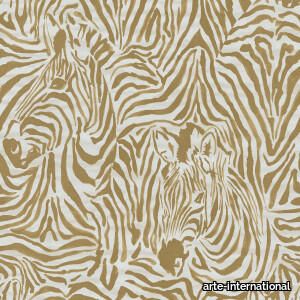
arte-international > Wallcovering
A spectacular camouflage design inspired by a herd of zebras like those you see on the African steppe. You can even discover hidden zebra heads here and there in the abstract lines of the zebra’s skin.
VESTIAIRE MASCULIN - ELÉGANTE - Solid-color raffia wall fabric _ Élitis

Élitis > Wallcovering
Elégante is a luxurious wallcovering crafted from a silky blend of 70% raffia and 30% cotton, elegantly woven on a non-woven backing, offering a refined texture and a useful width of 110cm (45"). This handcrafted piece exudes a Parisian couture ambiance, inspired by timeless androgynous icons immortalized in film, and celebrates the sophistication of natural fibers like linen, jute, and raffia. The design features a delicate interplay of light and texture, with occasional metallic sheens reminiscent of a gentleman's cufflink, adding a touch of timeless dandyism. A 3D file of the product is available for download, allowing for seamless integration into design projects. Supplied by Élitis, a prestigious French interior design brand founded in 1988, this product reflects the company’s commitment to innovative, high-quality, and luxurious designs that blend contemporary aesthetics with timeless elegance.
Pandan
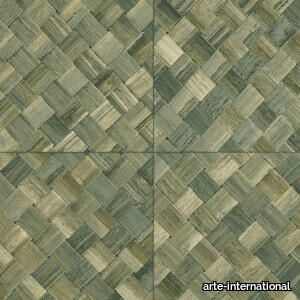
arte-international > Wallcovering
Wickerwork in tile shape is inspired by the tropical plant pandan. The fibres of this plant are diagonally cut into strips and are interwoven. The clean, diagonal lines appear less abstract thanks to the natural look and feel.
Glade
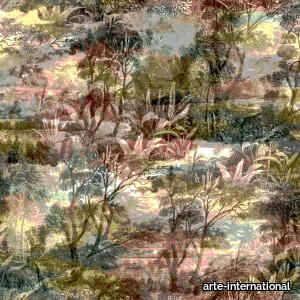
arte-international > Wallcovering
A sultry, hot jungle, hidden in the mist. It’s easy to dream the day away when you’re surrounded by colour and tropical animals. Glade brings the jungle into your home with a mysterious forest design on a tangible, woven structure.
Kimono
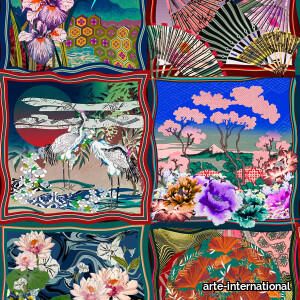
arte-international > Wallcovering
Six silk foulards with Eastern scenes are the source of inspiration for this composition. The colour explosion is perfectly balanced and creates one harmonious and panoramic whole.
Tesori Broccato grigio
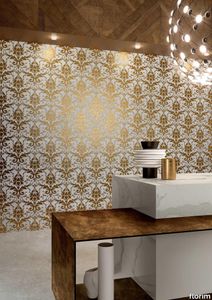
florim > Wallcovering
East and West, a synthesis archieved through Italian taste. «My work often takes me to far-off lands, also remote in terms of their culture and traditions. Even without my being aware of it, I then metabolise these traditions and include them in the designs I subsequently produce.» Matteo Nunziati <p>"It is the architect's task to create a warm, livable space. Carpets are warm and livable. He decides for this reason to spread one carpet on the floor and to hang up four to form the four walls. But you cannot build a house out of carpets. Both the carpet and the floor and the tapestry on the wall required structural frame to hold them in the correct place. To invent this frame is the architect's second task."When Adolf Loos wrote his revolutionary essay on the "principle of cladding" in 1898, architecture was just entering the modern age. Building meant imagining structures capable of putting together different materials, but, Loos affirmed, it must also respect their individual characteristics. "Every material possesses a formal language which belongs to it alone and no material can take on the forms proper to another", the Austrian master therefore maintained. And there is no doubt that the spirit of these words extended throughout most Twentieth Century architecture, regardless of its location or style. When we look at Matteo Nunziati's designs for the CEDIT Tesori collection, we seem to be seeing geometrical purity and attention to detail at the service of a new "truth" of material. Because Matteo Nunziati views ceramics as a form of fabric.<br /> The woven patterns he imagines for the various styles in his collection "“ from Arabian to damask to more geometrical motifs "“ constantly seek to provide the soft, iridescent look of time-worn linen. In them, ceramics are raised from the status of poor relation of marble to become a luxury wall covering in their own right: almost a wallpaper, suitable however for both floors and walls, and an absolutely versatile material. No longer only for beautifying bathrooms, they can create new moods in every room of the house (and elsewhere) starting from the living-room. Naturally, the revolution has been mainly technological. The large slabs produced by CEDIT are more than 3 metres tall, and since they eliminate the serial repetition typical of conventional tiles, they generate a new relationship between the surface and its decoration. However, Nunziati does not use this to create, artist-like, a more eye-catching decorative composition that emphasises the slab's dimensions. Quite the opposite; the patterns he offers us attempt to break down what is left of the boundaries between substrates. In particular, the Arabian and damask styles, in the version with "timeworn" patterning, convey the idea of the ceramic slab as an abstract, almost non-existent material which melts into the decorative motif applied to it, in a kind of pure wall covering.<br /> Through the patient selection of geometrical motifs and tests to verify their suitability for application to ceramic slabs, Nunziati aims to achieve a new material rather than a mere decoration, making this clear by also exploring its tactile dimension, with gouged and relief motifs. His "principle of coverings" therefore relates to ceramics' essence rather than their image: highlighting the versatility which, as we all know, has made ceramics an absolute material, a kind of cement that incorporates structure and finish in a virtually infinite range of applications. This is clearly indicated by the reference to the mashrabiya, a term meaning place where people drink in Arabic, which in Arabian architecture originally referred to the kind of veranda where people used to meet and rest, and over time has come to mean the wooden gratings that screened these places from the sun. Inspired by his trips to the Middle East, for Nunziati the geometric patterns of the mashrabiya become both an outline of his method of work and the form of what in fact becomes the key element in a new idea of space: a real location conceived around a strong, livable surface in which physical substance and decoration overlap to the point where they merge.</p>
Dodo Pavone
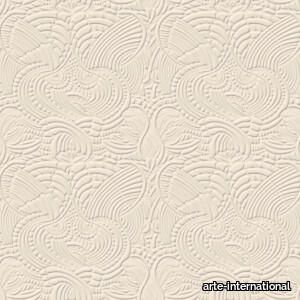
arte-international > Wallcovering
3D wallcovering with a soft suede look, inspired by the Dodo Pavone’s natural outfit – a soft plumage of silvery feathers with different nuances of grey, blue, beige and white.
JEAN PAUL GAULTIER - FLOWER POWER - Outdoor polyester fabric with floral pattern _ LELIEVRE
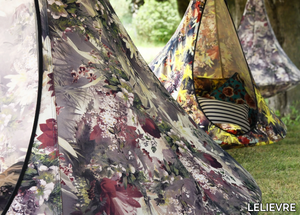
LELIEVRE > Wallcovering
Eri
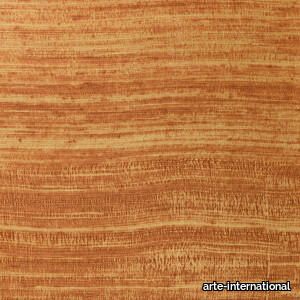
arte-international > Wallcovering
Eri turns every wall into a unique object. Pure luxury. Inspired by open weave silk and applied on a base of delicate high-gloss foil. The warm glow of the precious metal shines through the fine mesh of the fabric, for a more pronounced and exclusive look.
